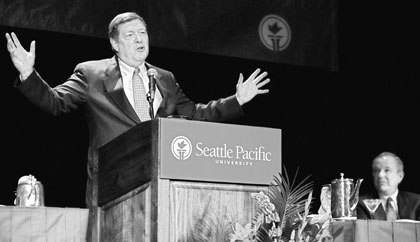Story by Sarah Jio
Photo by
Mike Siegel

Ambassador Robert Seiple Challenges Downtown Leaders to Provide Answers

With September 11 and the current Middle East crisis setting the stage, former U.S. Ambassador Robert Seiple presented a message about freedom, faith and hope at the annual Greater Seattle Community Breakfast on April 24 at the Sheraton Hotel in Seattle.
In its successful six-year history, Seattle Pacific University's Community Breakfast has featured nationally renowned speakers such as William Bennett, George Mitchell and George Will. The event has become an important forum for exploring ideas with business and government leaders and is an important expression of SPU's vision of "engaging the culture and changing the world."
At this year's Breakfast, Jeff Van Duzer, dean of SPU's School of Business and Economics and one of the hosts of the event, stated his belief in the importance of coming together to discuss principled engagement in the world. "I think the business community is crying out for a different model, … a way that has a greater sense of purpose and nobility to it," said the former partner-in-charge at Davis Wright Tremaine to an audience of 900. "I think SPU is uniquely well-situated to engage in that dialogue and to help develop that model."
"In a time gripped by confusion and darkness, our Breakfast is one small effort to shine the light toward a better, brighter world," echoed SPU President Philip Eaton in his opening remarks.
Featured speaker Seiple began his address by painting a verbal picture of another time of confusion and darkness: Russia. 1946. A Stalin-dictated nation in utter desolation. One woman, the late poet Anna Akhmatova, watches her husband executed and son imprisoned — both without reason. "Can you describe this?" she is asked by a woman whose family has also been destroyed. "Can you make sense of this?"
"The beginning of hope is making sense out of the present," said Seiple, president of the Institute for Global Engagement and former U.S. ambassador-at-large for international religious freedom and president of World Vision Inc. "Can you describe this? That's the critical question. The unnamed masses of post-September 11 people are desperate for an answer. … And we must try. I think that what is at stake is the very relevancy and impact of our faith."
From Vietnam to Rwanda, Seiple has witnessed religious oppression at its worst. He has documented a link between religious freedom and the prospects for peace and security in the world. "When this freedom is gone, all the other freedoms are suspect. … We can literally track a country and where it's going and how fast it's going to get there on a developmental continuum by how it deals with this issue."
Speaking out of his experience, Seiple advised the audience about living constructively in today's world. Don't be paralyzed by paradox, ambiguity, messiness and unanswered questions, he said. "We need to cultivate discernment in the midst of it. Truth is there, but it's hidden."
September 11 shattered the goal of keeping pain from our shores, he continued. "It broke our hearts, and gave us a new sense of commonality. Perhaps it didn't change our world, but rather introduced us to everyone else's world."
So, how should we rise up from a world laden with atrocities and confusion? "Know your faith, know how it works. Then know enough about your neighbors to respect them. ... And understand the cost of suffering.
"We need to learn from the persecuted Church … what the costs of Christianity really mean. And gratefully, I think, the lessons are becoming clearer." Seiple left the audience with a call to action. "The world looks to us for answers," he says. "They look to groups like this. They look to leadership gatherings of the academy, of the church, of the business community, to forge answers, to make sense, to provide tangible expressions of hope today that make tomorrow's hope legitimate and credible — understanding our identity in the light of [God's] identity in a way that makes sense of the world that he still loves."
"Can you describe this?" he concluded. "I think we can, and we certainly must."
Editor's Note: To request a printed transcript or e-mail transcript of the Greater Seattle Community Breakfast, e-mail response@spu.edu or call 206/281-2051.
![]()

| Please read our
disclaimer.
Send any questions, comments or correspondence about Response to jgilnett@spu.edu or call 206-281-2051. Copyright © 2001 University Communications, Seattle Pacific University.
Seattle Pacific University |